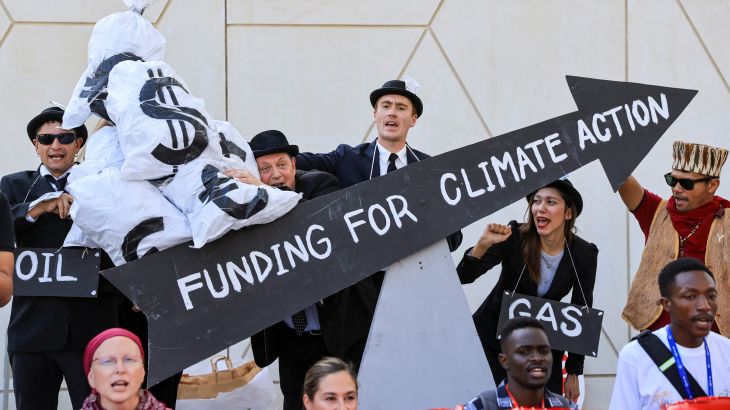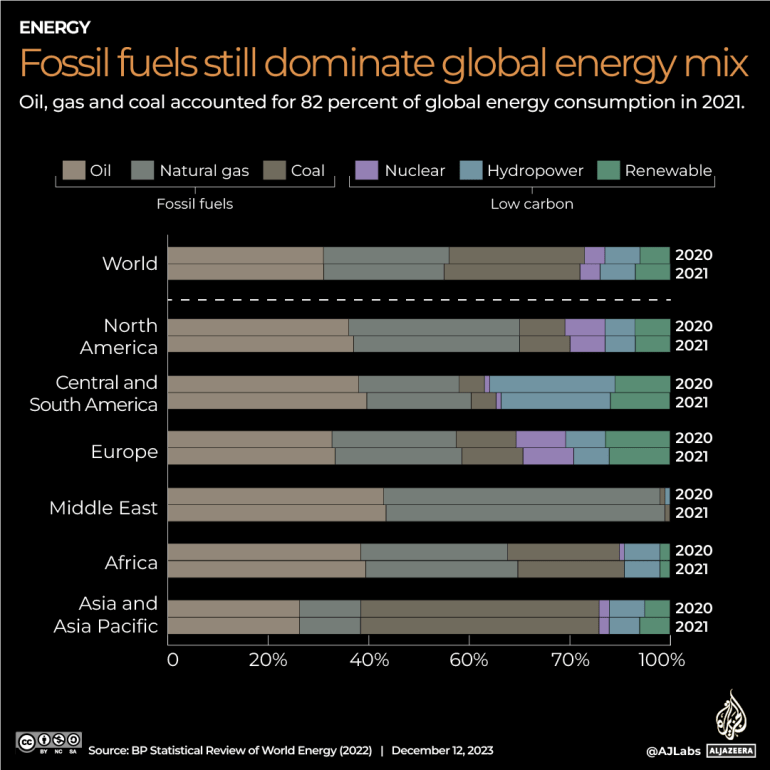COP28 Dubai is over: Four key highlights from the UN climate summit
A contentious Global Stocktake text amid a tough run for COP28 President al-Jaber – here are some key outcomes of the UN climate summit in the UAE.

Hundreds of world leaders and climate experts gathered at this year’s United Nations climate conference to witness the approval of a climate disaster “loss and damage fund” and a disputed agreement on transitioning away from fossil fuels while countries faced crushing assessments of their carbon emissions.
States attending the 2023 Conference of the Parties or COP28 were under pressure to adopt a new climate agreement amid controversy over the appointment of Sultan al-Jaber as president because of his position as a United Arab Emirates’s oil tycoon and his alleged questioning of climate science. Countries were also found to be falling behind in the first review of their progress towards reducing emissions to keep global warming in check.
Keep reading
list of 3 itemsCOP president defends climate science comments
2023 declared hottest year on record as UN slams climate inaction
Here are some of the key takeaways from the two-week UN climate summit held at Expo City, Dubai:
A disputed agreement on fossil fuels
One agreement tabled at the conference pushed it into overtime by a day as participants struggled to agree on how quickly fossil fuel production should be ceased. The final Global Stocktake agreement, adopted on Wednesday, marked the first COP text that openly called on countries to wean themselves off fossil fuels.
However, this was only an incremental improvement from a draft on Monday that caused outrage for dropping language to “phase down” or “phase out” fossil fuels, which more than 100 of the 200 attending countries had expressed support for.
“Phasing out” fossil fuels would mean putting a complete stop to fossil-fuel burning through goals such as reaching net-zero carbon emissions by a specific year. “Phasing down” fossil fuels involves gradually cutting down on fossil fuel burning without setting targets for the amount and deadline to achieve net zero.
The final text was able to secure a majority consensus within the 200 attending countries to include language to “transition away” from fossil fuels, which are responsible for nearly 90 percent of global carbon dioxide emissions, according to the UN.
It also calls to “phase down” the “unabated” use of coal. Targeting “unabated” coal use is contested as it allows unfettered levels of coal burning as long as the carbon dioxide it generates is more frequently removed from the atmosphere and stored underground – which climate experts say is insufficient for reducing the impact of emissions.
“The absence of explicit ‘phase-out’ language in the draft is significant, as it is a more measurable and definitive term, sending a strong message globally about a total shift away from fossil fuels,” Harjeet Singh, head of global political strategy at Climate Action Network International, told Al Jazeera. “The current terminology – ‘transitioning away’ – is somewhat ambiguous and allows for varying interpretations.”
Although the adoption of the first deal on fossil fuels is a win, experts also say its details are flawed.
“The resolution is marred by loopholes that offer the fossil fuel industry numerous escape routes, relying on unproven, unsafe technologies,” said Singh in a public statement.

‘Loss-and-damage’ fund approved
The conference started on a positive note with the approval of a climate disaster “loss and damage fund” that was first tabled at COP27 in Egypt last year.
The fund is meant to support vulnerable communities and developing nations which are struggling to cope with the impact of climate disasters such as the destruction of crops caused by floods. However, developed nations have been criticised over the amount of money they are willing to extend.
Several countries have pledged a total of $700m, which falls far short of the estimated $400bn damage caused by climate change each year. In September, a group of developing countries had asked for at least $100bn to be committed to the fund.
The UAE pledged $100m, which was matched by Germany. Italy and France promised more than $108m, while the United Kingdom pledged $50.8m. The United States and China, despite being the world’s largest emitters, extended only $17.5m and $10m, respectively.
Aside from gathering pledges, attendees at this year’s summit discussed how to operate the fund in a meaningful manner, while its board is expected to meet in January to finalise the framework and begin operations, according to Rishikesh Ram Bhandary, assistant director of the Global Economic Governance Initiative at Boston University.
Paris Agreement progress discussed at COP28
The need for new climate plans and more robust, multilateral climate change mitigation projects has become even more pressing in light of growing gaps in meeting Paris Agreement goals, said Bhandary. Some 196 countries have signed the binding international agreement, which was adopted in 2015.
COP28 concluded the first assessment of progress each state has made towards reducing emissions for the agreement’s central tenet – limiting the global temperature rise to 1.5 degrees Celsius (2.7 degrees Fahrenheit) above pre-industrial levels.
Adhering to the Paris Agreement is “crucial” for motivating countries to devise renewed climate plans and “bring us closer to where we need to be”, said Bhandary. The next global assessment of Paris Agreement targets is expected to take place at COP33 in 2028.
Global finance ‘unsupportive’ of renewables
Like some of the previous COPs, more than 100 countries at this year’s summit endorsed tripling reliance on renewable energy sources to reduce the world’s dependency on fossil fuels. However, experts say such goals are difficult given the financial pressures on developing nations.
Rising interest rates in advanced economies mean that the high levels of debt developing countries have are becoming ever more expensive to service. Debt repayments leave poorer nations with little to invest in sectors such as health or climate change mitigation. About 70 nations are in “debt distress”, according to an International Monetary Fund report released in August, meaning they have defaulted on loan repayments or are on track to default.
According to Bhandary, the global financial system must restructure debt for developing countries to enable them to sufficiently invest in climate change measures.
“There is tremendous recognition of the fact that the international financial architecture as a system has to really move in order to reinforce and unlock progress within the COP process,” said Bhandary.
Other controversies and highlights at COP28
- Al-Jaber accused of denying climate science: The Abu Dhabi national oil and gas company chief hit out against what he said were “repeated attempts to undermine” his presidency. He said his questioning of climate science in a leaked video was “taken out of context with misrepresentation”. Jim Skea, chair of the Intergovernmental Panel on Climate Change, said al-Jaber “has been attentive to the science as we have discussed it and I think has fully understood it”.
- OPEC pressures: OPEC issued a letter to its members on December 6 to “proactively reject any text or formula that targets energy ie fossil fuels rather than emissions”. Saudi Arabia, the largest oil producer, is the de facto head of the 24-member country group. The secretariat also labelled campaigns against fossil fuels as “politically motivated”.
- Protests on the sidelines: Although the UAE prohibits demonstrations, several groups held protests on the sidelines over issues including the Israel-Gaza war and the holding of political prisoners in the UAE. In September, COP’s presidency agreed to allow “climate activists to assemble peacefully” at the summit.
- Melodi photo: Indian Prime Minister Narendra Modi and his Italian counterpart, Giorgia Meloni, took social media by storm on the second day of the summit with a selfie the latter posted to her X account with the hashtag “Melodi”.
Good friends at COP28.#Melodi pic.twitter.com/g0W6R0RJJo
— Giorgia Meloni (@GiorgiaMeloni) December 1, 2023
What’s next at COP29?
After several rounds of negotiations at COP28, Azerbaijan was announced as the host of COP29, scheduled for November 2024.
Activists have already begun to criticise the decision over the country’s oil production and human rights record. Azerbaijan is not part of OPEC but closely collaborates with the group in the OPEC+ offshoot which has 11 additional countries.